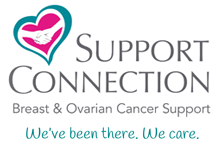(Originally published by Lohud.com, 9/25/15. Updated 9/3/20)
By Barbara Cervoni, Support Connection, Inc.

In 1998, when she was 43, Debra Paget called her doctor because she felt some strange things were happening with her body. She said she was having some spotting when she shouldn’t have been.
After her diagnosis, Debra made a point of learning more about ovarian cancer. She was surprised to discover she’d had some warning signs that she missed: stomach and appetite problems, bloating, clothes that no longer fit. Common, seemingly benign things that most women experience at one time or another. Debra says:
“At first, we thought it was perimenopause, but when it got worse, I called again and went in to see her,” Debra said. Within days, Debra was in surgery, and diagnosed with ovarian cancer.
Fortunately Debra’s ovarian cancer was still caught at a very early stage and now, 22 years later, she leads a healthy and active life. But for many women, the symptoms of ovarian cancer slip by unnoticed. When that happens, the outcome can be very different.
According to the American Cancer Society, when ovarian cancer is found early, about 94% of women live longer than five years after diagnosis. Unfortunately, only about 20% of ovarian cancers are found at an early stage. This is significant because ovarian cancer ranks fifth in cancer deaths among women, and accounts for more deaths than any other cancer of the female reproductive system. And it’s estimated that about 21,750 new cases of ovarian cancer will be diagnosed annually in the U.S. in 2020, although the vast majority are diagnosed at a later stage, when treatment is more challenging.
Why is early detection of ovarian cancer so difficult? To start, there’s no screening test for the disease. The Pap test women undergo with routine gynecological exams only screens for cervical cancer. And as Debra learned, the symptoms that do occur are often mistaken (by women and even by doctors) for other, less serious ailments.
The key to early diagnosis of ovarian cancer is learning the symptoms and listening carefully to your body. The National Ovarian Cancer Coalition advises women to watch for the following potential signs, and if they persist for more than two weeks, see a physician:
- Bloating
- Pelvic or abdominal pain
- Trouble eating or feeling full quickly
- Feeling the need to urinate urgently or often.
Other possible symptoms include: fatigue; upset stomach or heartburn; back pain; pain during sex; constipation or menstrual changes.
Of course, having one or more of these symptoms is not always a sign of cancer. If symptoms continue, however, women need to be on alert. The Ovarian Cancer Research Alliance advises: See your doctor, preferably a gynecologist, if you have these symptoms more than 12 times during the course of one month and the symptoms are new or unusual for you.
Empowering women to be proactive about their own health is a priority for Support Connection, Inc., a Yorktown based not-for-profit that provides free breast and ovarian cancer support programs. Every September, in honor of National Ovarian Cancer Awareness Month, Support Connection launches their annual “Tune In and Take Charge” campaign to bring attention to ovarian cancer. The campaign aims to deliver crucial messages and information about the disease and its symptoms, while encouraging women to speak up to their doctors when something doesn’t seem right.
For women who’ve already been diagnosed with ovarian cancer, Support Connection offers help and support in a variety of forms. There’s personalized one-on-one counseling and resource referral, available by toll-free telephone, email and in person. There are monthly support groups, including one that meets by national toll-free teleconference. Educational and wellness programs take place throughout the year. Informational resources, webinars and articles are shared on the organization’s website. Special events, such as the annual Support-A-Walk for breast and ovarian cancer, provide opportunities for women to connect and share with one another.
Debra benefited from Support Connection’s help when she received her diagnosis. And ever since then, she’s made it her business to share her story whenever she can, hoping to help other women know how to look for ovarian cancer:
“We know when something’s wrong, we just need to listen to our bodies, and be our own best advocates. If you have a concern, see your doctor and make sure they do a thorough exam. It could save your life. It saved mine!”
For more about ovarian cancer and resources for women who’ve been diagnosed:
Barbara Cervoni is director of services and communication at Support Connection, Inc., a Yorktown based not-for-profit organization that provides year round free counseling and other support services to women and families affected by breast and ovarian cancer.
